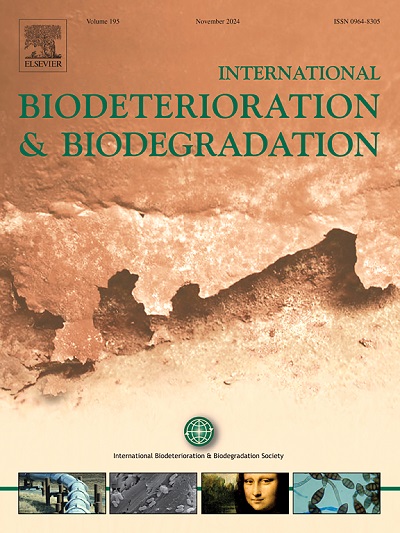Microplastics impair black soldier fly bioconversion of pigeon manure: Physiological and transcriptomic insights
IF 4.1
2区 环境科学与生态学
Q2 BIOTECHNOLOGY & APPLIED MICROBIOLOGY
International Biodeterioration & Biodegradation
Pub Date : 2025-07-27
DOI:10.1016/j.ibiod.2025.106181
引用次数: 0
Abstract
The black soldier flies (BSFs) are widely used for efficient conversion of livestock and poultry manure, but the impacts of microplastics (MPS) present in the manure on this process remain unclear. This study investigated the effects of 0.2 % (w/w) PVC microplastics (200 nm) on the bioconversion efficiency of manure by BSFs over a two-week larval development period, incorporating transcriptomic analysis to examine their impacts on larval growth, development, and metabolic processes. Results showed that MPS exposure altered manure physicochemical properties, making it wetter and less palatable, which reduced nitrogen transformation and inhibited larval growth by 11.05 % in body weight and 4.42 % in length. Meanwhile, oxidative stress was significantly elevated, with SOD activity increasing by 106 %, leading to a 26 % increase in early pupation. Transcriptomic analysis revealed that MPS accumulated in the BSF intestine disrupted glutamine metabolism, triggered inflammatory responses, and elevated reactive oxygen species production. Intestinal damage such as villus shedding induced the upregulation of serine endopeptidases. To compensate for impaired digestion, key genes involved in gluconeogenesis were significantly upregulated, including protein kinase A (2.39-fold), L-lactate dehydrogenase (1.72-fold), and pyruvate kinase (2.05-fold), helping to maintain energy homeostasis. Furthermore, nitrogen metabolism pathways showed enhanced expression of glutamate-related genes, facilitating the transition to the prepupal stage. These molecular and physiological responses represent an adaptive mechanism to environmental stress but ultimately resulted in compromised bioconversion efficiency. Therefore, removing MPS from manure is crucial for optimizing BSF-based bioconversion and promoting sustainable waste treatment.

微塑料损害黑兵蝇对鸽子粪便的生物转化:生理学和转录组学的见解
黑兵蝇(bsf)被广泛用于畜禽粪便的高效转化,但粪便中存在的微塑料(MPS)对这一过程的影响尚不清楚。本研究研究了0.2% (w/w) PVC微塑料(200 nm)对bsf在两周幼虫发育期间粪便生物转化效率的影响,并结合转录组学分析来研究其对幼虫生长、发育和代谢过程的影响。结果表明,多磺酸粘多糖暴露改变了粪便的理化性质,使其变得更湿、更不美味,减少了氮的转化,使幼虫的体重和长度分别下降11.05%和4.42%。同时,氧化应激显著升高,SOD活性增加106%,导致早期化蛹增加26%。转录组学分析显示,在BSF肠道中积累的MPS破坏了谷氨酰胺代谢,引发了炎症反应,并增加了活性氧的产生。绒毛脱落等肠道损伤可引起丝氨酸内肽酶的上调。为了弥补消化受损,参与糖异生的关键基因显著上调,包括蛋白激酶A(2.39倍)、l -乳酸脱氢酶(1.72倍)和丙酮酸激酶(2.05倍),有助于维持能量稳态。此外,氮代谢途径中谷氨酸相关基因的表达增强,促进了向蛹前阶段的过渡。这些分子和生理反应代表了对环境胁迫的适应机制,但最终导致生物转化效率受损。因此,从粪便中去除MPS对于优化基于bsf的生物转化和促进可持续废物处理至关重要。
本文章由计算机程序翻译,如有差异,请以英文原文为准。
求助全文
约1分钟内获得全文
求助全文
来源期刊
CiteScore
9.60
自引率
10.40%
发文量
107
审稿时长
21 days
期刊介绍:
International Biodeterioration and Biodegradation publishes original research papers and reviews on the biological causes of deterioration or degradation.

 求助内容:
求助内容: 应助结果提醒方式:
应助结果提醒方式:


